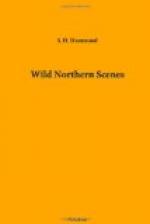Pshaw! You have spoiled, with your worldliness, your greed for progress, your thirst for gain, a pleasant fancy, a glorious dream, as if everything in the heavens, on the earth, or in the waters, were to be measured by the dollar and cent standard, and unless reducible to a representative of moneyed value, to be thrown, as utterly worthless, away. Let us row back to the Lake House.
CHAPTER III.
THE DEPARTURE—THE STAG HOUNDS—THE CHASE—ROUND LAKE.
From Martin’s Lake House we were to take our departure in the morning. We had arranged for three boats, and as many stalwart boatmen. Two of these boats were for our own conveyance, and one for our luggage and provisions; the latter to be sent forward with our tents in advance, so as to have a home ready for us always, at our coming, when we chose to linger by the way. These boatmen were all jolly, good-natured and pleasant people, with a vast deal of practical sense, and a valuable experience in woodcraft, albeit they were rough and unpolished. Their hearts were in the right place, and they commanded our respect always for their kindness and attention to our wants, while they maintained at all times that sturdy independence which enters so largely into the character of the border men of our country. Their boats are constructed of spruce or cedar boards of a quarter of an inch in thickness, “clap-boarded,” as the expression is, upon “knees” of the natural crook, and weigh from ninety to one hundred and ten pounds each. They are carried around rapids, or from river to river, on the back of the boatman in this wise: A “yoke” is provided, such as every man in the country, especially all who have visited a “sugar bush” at the season of sugar making, has seen. At the end of this yoke is a round iron projection, made to fit into a socket in the upper rave of the boat. The craft is turned bottom upwards, the yoke adjusted to the shoulders, the iron projections fitted into the sockets, and the boatman marches off with his boat, like a turtle with his shell upon his back. He will carry it thus sometimes half a mile before stopping to rest.
With us were to go two staid and sober stag hounds, grave in aspect and trained and experienced, almost, in woodcraft, as their masters; animals that had been reared together, and who possessed the rare instinct of returning always to the shanty from which they started, however far the chase may have led them. It was a glorious sound in the old forests, the music of those two hounds, as their voices rang out bold and free, like a bugle, and went, ringing through the forest, echoing among the mountains and dying away over the lakes. But of that hereafter.




